Tylenol Class Action Lawsuits: Collective vs. Individual Claims
- Last Updated: June 12th, 2025

Attorney Jessie Paluch, founder of TruLaw, has over 25 years of experience as a personal injury and mass tort attorney, and previously worked as an international tax attorney at Deloitte. Jessie collaborates with attorneys nationwide — enabling her to share reliable, up-to-date legal information with our readers.
Legally Reviewed
This article has been written and reviewed for legal accuracy and clarity by the team of writers and legal experts at TruLawsuit Info and is as accurate as possible. This content should not be taken as legal advice from an attorney. If you would like to learn more about our owner and experienced injury lawyer, Jessie Paluch, you can do so here.
Fact-Checked
TruLawsuit Info does everything possible to make sure the information in this article is up to date and accurate. If you need specific legal advice about your case, contact our team by using the chat on the bottom of this page. This article should not be taken as advice from an attorney.
Key Takeaways:
- Tylenol lawsuits offer the choice between collective class action and individual claims.
- Class actions provide cost savings, efficiency, and access to justice for many plaintiffs.
- Individual claims offer more control but can be resource-intensive. Choosing the right path is essential.
Tylenol Class Action Lawsuits: Collective vs. Individual Claims
Tylenol has been the subject of numerous acetaminophen litigation and mass torts, including acetaminophen autism cases and mass tort litigation.
These collective legal actions, often referred to as mass torts, are frequently sparked by product liability claims.
Allegations of undisclosed side effects or potential links to conditions such as autism have significantly impacted Johnson & Johnson, the manufacturer.
This has led to numerous product liability lawsuits, including the high-profile Tylenol acetaminophen litigation.
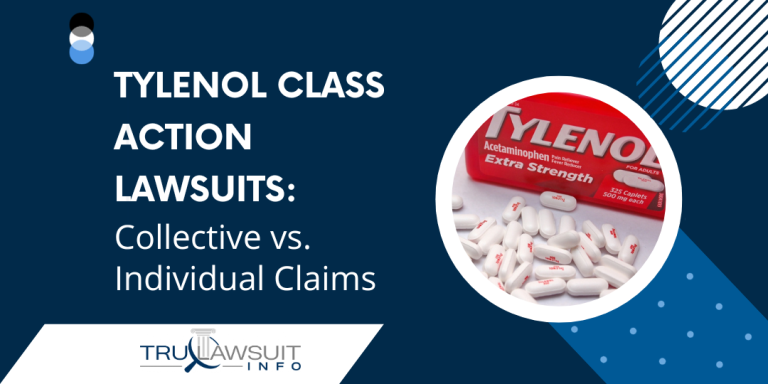
In a typical Tylenol mass tort, plaintiffs band together with attorneys to seek justice and compensation for perceived harm caused by acetaminophen products, often leading to multidistrict litigation or trial.
The process of product liability lawsuits involves intricate legal maneuvers like multidistrict litigation and necessitates the active role of plaintiffs, guided by their attorneys, in pursuing their Tylenol acetaminophen litigation claims against the pharmaceutical giant.
While individual product liability claims are also an option for plaintiffs, they’re often overshadowed by the sheer scale and influence of mass tort lawsuits led by attorneys.
This article will provide a detailed analysis of the Tylenol class action lawsuits, specifically focusing on the differences between collective and individual claims.
We will examine the benefits and downsides of each type of claim, as well as their implications for both the plaintiffs and the pharmaceutical industry.
This comprehensive review of the litigation involving Tylenol will also highlight its potential influence on future consumer protection cases.
The information provided aims to offer a clear understanding of the legal complexities surrounding this issue.
Table of Contents
Collective vs Individual Claims: Differences
Mass tort litigation, often seen in class action lawsuits like those involving Tylenol, are legal actions where a large number of plaintiffs who have suffered similar harm join together to sue a defendant for product liability.
The primary advantage of collective claims is the efficiency they provide, particularly in addressing preemption issues and ensuring compensation for plaintiffs.
Instead of having multiple lawsuits for the same issue, a mass tort consolidates the Tylenol litigation cases into one trial, with plaintiffs collectively asserting their claim.
Check out the following:
- Consistent associations among group members
- Shared decision-making process
- Potential for larger amounts in damages if successful
Collective decisions, as evidenced in numerous cases and studies, can also lead to more significant change over time.
They can bring attention to systemic problems that need addressing, establishing a causal link between the parties involved.
However, it’s important to note that even though a study might indicate potential warning signs, expert opinions, and case studies aren’t always enough to support these types of claims – solid scientific evidence is essential.
Understanding Individual Claims
On the contrary, individual product liability cases involve one plaintiff suing on their own behalf in litigation like the Tylenol lawsuit.
This type of litigation allows plaintiffs more control over their cases and could result in a higher court payout if they win their claim:
- Personalized approach to handling claim
- Greater control over decisions
- Potential for higher payout if successful
While individual litigation cases may require more time and effort, they allow plaintiffs to receive personalized attention to detail that might not be possible with collective compensation decisions.
The success of individual litigation cases often relies heavily on specific facts and circumstances unique to each plaintiff, frequently determined in court.
Key Differences
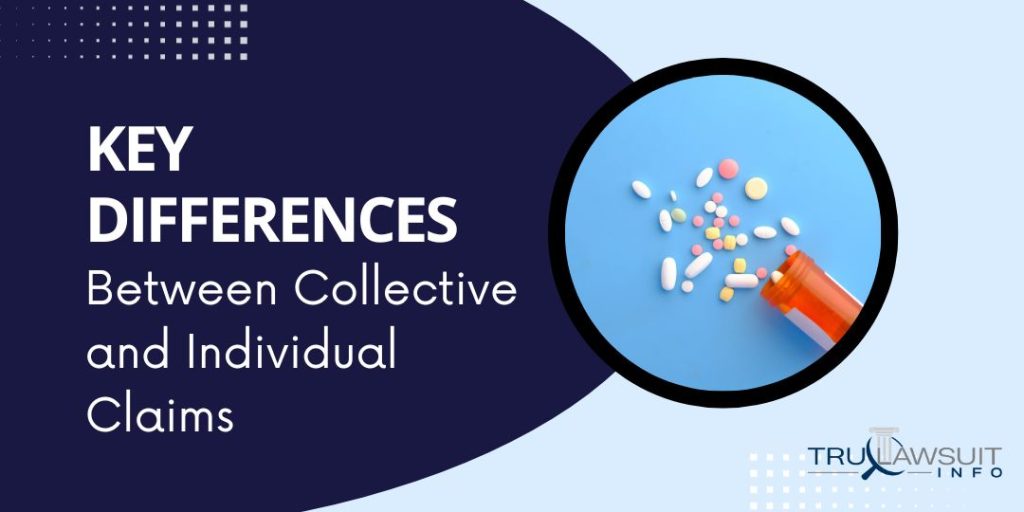
The key differences between collective and individual litigation cases primarily lie in the numbers of plaintiffs, control, risks involved, potential compensation payouts, and the nature of the claims.
It’s also worth noting that while studies and Tylenol litigation projections can suggest court outcomes based on past cases, each claim is unique and carries different risks, potentially leading to varied results.
Preferred Circumstances
Choosing between collective or individual litigation often depends on the specifics of court cases and the situation of the plaintiffs involved.
For instance, if there’s a fact sheet showing consistent associations among a large group of plaintiffs who used the acetaminophen-based Tylenol and experienced similar issues, a class action lawsuit might be more beneficial in such cases.
On the other hand, if plaintiffs have experienced significant harm not common to others in similar court cases, they may prefer to file an individual Tylenol autism lawsuit, acknowledging the risk involved.
Background: Reasons for Tylenol-Related Lawsuits
The surge in Tylenol class action lawsuits involving numerous plaintiffs and cases stems from the alleged harmful effects of acetaminophen use despite the warning.
The primary cause under scrutiny in the plaintiffs’ cases against Walmart is acetaminophen, the active ingredient in both brand name and generic products, including Tylenol.
The exposure to this substance is a key point of contention.
Exposure to Acetaminophen, commonly known as Tylenol, has been linked to autism and various health complications, leading to warning notices and dangerous drug lawsuits.
These cases have seen numerous plaintiffs seeking justice.
High doses of this over-the-counter drug, acetaminophen, often found in Tylenol, have reportedly caused liver damage, sometimes severe enough to require a liver transplant or result in death.
This has led to a Tylenol class action lawsuit and multiple individual Tylenol lawsuits, prompting a stern warning about its usage.
Prenatal Acetaminophen Exposure and Autism Concerns
In addition to these significant health risks associated with pregnancy, there have been reported cases linking prenatal acetaminophen exposure, a key focus of the Tylenol class action lawsuit, to autism and ADHD, further fueling the Tylenol lawsuit.
A 2016 study published in JAMA Pediatrics found that children exposed to acetaminophen (Tylenol) prenatally, often due to ADHD or pregnancy issues, had a 40% higher risk of autism spectrum disorder (ASD), leading to an increase in Tylenol lawsuits.
This discovery sparked a wave of concern among expecting mothers who regularly use acetaminophen, a common over-the-counter drug for pain relief during pregnancy.
The warning and potential Tylenol lawsuit have intensified these worries.
Tylenol Class Action Lawsuits: The Challenge of Establishing Causation
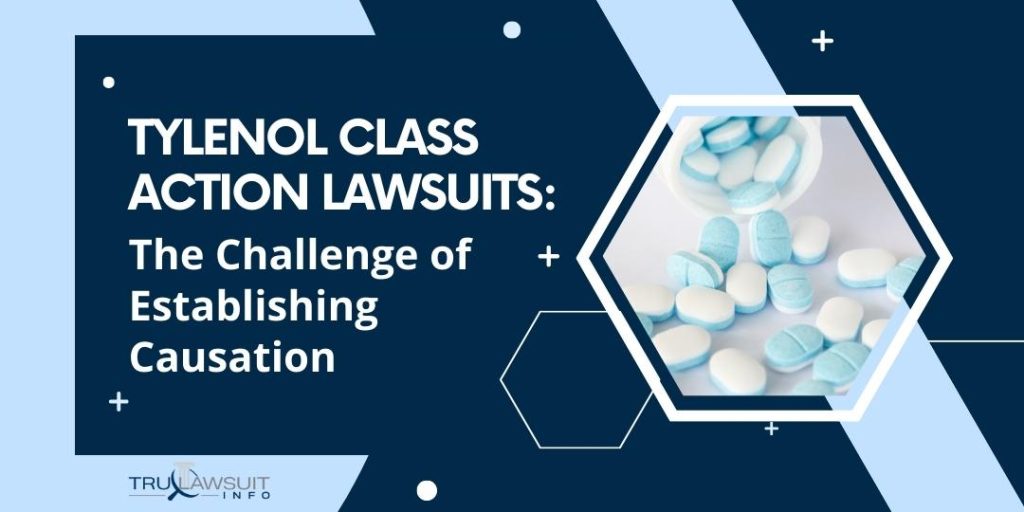
However, it’s essential to note that while these studies suggest a correlation between prenatal acetaminophen use, often linked with Tylenol autism lawsuits, and ASD in children, they do not conclusively prove causation.
The relationship between pregnancy, ADHD, and the potential effects on children is also under investigation.
The scientific causation evidence for ADHD in children remains inconclusive due to factors such as genetic predisposition and environmental influences during pregnancy, which also play roles in ASD and ADHD cases development.
Despite the lack of definitive causation proof, several plaintiffs, predominantly parents, have initiated cases against Johnson & Johnson, the makers of the acetaminophen-based Tylenol, citing its effects on their children.
These plaintiffs allege that their children’s ADHD was caused by prenatal exposure to acetaminophen, a common ingredient in Tylenol, during pregnancy and accuse the company of failing to provide adequate warnings about potential dangers associated with its product.
This has led to a class action lawsuit against the company.
These allegations have led to an ongoing court debate regarding collective vs. individual claims in dangerous drug lawsuits like those involving acetaminophen, specifically Tylenol.
The plaintiffs are considering a class action approach.
Some argue that class action suits, like those involving plaintiffs who are children, can help ensure justice for all affected parties by pooling resources and sharing legal costs.
However, in the context of the Tylenol autism class action lawsuit, others contend that individual claims can yield higher compensation amounts for plaintiffs.
Overseeing the MDL, believes they allow for more personalized representation based on individual circumstances and damages.
Tylenol Class Action Lawsuits: Role of FDA in Tylenol Warnings and Litigation
FDA’s Role in Drug Safety Regulation
The Food and Drug Administration (FDA) plays a crucial role in ensuring the safety of drugs like acetaminophen, especially during pregnancy.
The FDA’s decision can significantly influence the rulings of an MDL judge.
The agency oversees the testing, approval, and monitoring of medications, including over-the-counter drugs like Tylenol, which contains acetaminophen.
They also review its use during pregnancy and potential links to ADHD, following the MDL guidelines.
This includes evaluating potential risks and benefits of acetaminophen during pregnancy, reviewing warning labels for clarity and accuracy in the MDL lawsuit, and taking action when safety issues arise.
FDA Warnings Regarding Tylenol Use
In recent years, the FDA has issued several warnings regarding the use of Tylenol, specifically acetaminophen, during pregnancy due to potential links found in an MDL study between its use and autism.
These warnings, often highlighted in an MDL lawsuit, primarily focus on the risk of liver damage from acetaminophen, the active ingredient in Tylenol, particularly during pregnancy, and its potential link to ADHD.
In 2013, for instance:
- The agency recommended that, during pregnancy, doctors avoid prescribing combination drug products with more than 325 mg of acetaminophen, like Tylenol, due to potential links to autism and ADHD, in line with MDL guidelines.
- The blog also advised pregnant consumers not to use more than one product containing acetaminophen, such as Tylenol, at a time due to potential autism risks, according to recent MDL studies.
These actions, including the use of acetaminophen during pregnancy and its potential link to Tylenol autism, aimed to reduce instances of accidental overdose, which could lead to severe liver damage or death, thus sparking an MDL.
How FDA Involvement Affects Litigation Outcomes
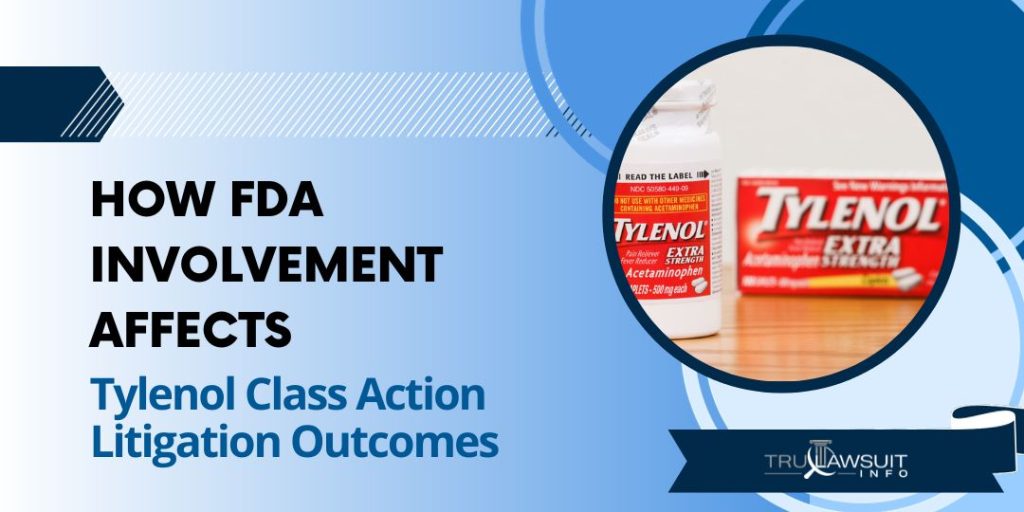
The involvement of the FDA can significantly influence the outcome of a lawsuit in action, especially in cases involving pharmaceuticals like acetaminophen, commonly known as Tylenol, and issues related to pregnancy.
As an authoritative judge on drug safety, their warnings about acetaminophen carry weight in a lawsuit action in court.
If a company fails to adequately heed these warnings or provide sufficient warning labels for consumers, it could face a lawsuit.
Such legal action may result in the company being held liable for damages caused by its product.
This could potentially lead to an MDL (multi-district litigation), with a judge presiding over the case.
For example:
- In numerous lawsuits involving Tylenol-related liver damage claims
- Plaintiffs in the Tylenol autism lawsuit have pointed towards Johnson & Johnson’s alleged failure to comply with FDA recommendations on acetaminophen as evidence of negligence, awaiting the judge’s decision.
Changes Made by Johnson & Johnson Following FDA Warnings
Following these warnings from the FDA about acetaminophen, Johnson & Johnson made several changes to their practices concerning Tylenol, a subject of an MDL lawsuit, especially in relation to its use during pregnancy.
Here are some of the changes:
- They updated their warning labels on acetaminophen during pregnancy to better emphasize potential risks, including Tylenol autism, in their MDL
- They reduced the maximum daily dose of Extra Strength Tylenol, an acetaminophen product, during pregnancy due to ADHD concerns, as per MDL guidelines.
- They initiated a public education campaign about the safe use of acetaminophen amidst the Tylenol autism controversy, pregnancy concerns, and an unfolding lawsuit within the MDL.
These actions demonstrate the company’s response to the lawsuit and FDA warnings regarding acetaminophen use during pregnancy, their commitment to consumer safety, and their stance on Tylenol autism concerns.
Analyzing Notable Tylenol Autism Settlements
Acetaminophen or Tylenol lawsuits, often associated with Tylenol, have marked significant milestones in the MDL legal landscape, particularly concerning ADHD and pregnancy.
These lawsuit cases, overseen by a judge, have not only brought justice to affected families but also shaped the course of future MDL litigations and their use.
Breakdown of Significant Settlements
Several notable settlements related to autism and ADHD claims against Tylenol, a popular acetaminophen product, have emerged over the years, leading to an MDL lawsuit.
In these Tylenol autism lawsuit cases, plaintiffs alleged that prolonged use of acetaminophen, an active ingredient in Tylenol, led to neurodevelopmental disorders such as autism and ADHD in children.
Factors Influencing Settlement Amounts
The settlement amounts in these lawsuit cases were influenced by various factors, including the judge’s decisions and the use of MDL:
- Proven link between acetaminophen and neurodevelopmental disorders
- The severity and impact of ADHD on the child’s life, the lawsuit, the MDL process, and the judge’s role.
- Legal representation by experienced Tylenol autism lawyers.
- The willingness of Johnson & Johnson to settle outside court
Legal Precedents Set By Notable Settlements
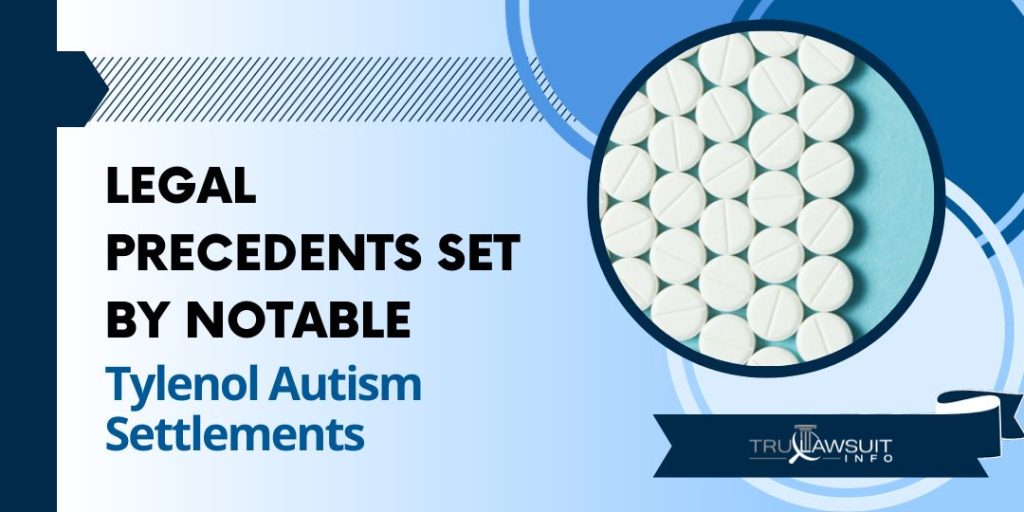
These settlements set important legal precedents:
- They established a link between acetaminophen usage, often known as Tylenol, and neurodevelopmental disorders such as autism and ADHD, leading to an MDL lawsuit.
- They underscored manufacturers’ responsibility for potential side effects associated with products like Tylenol, potentially linked to Tylenol and autism.
- This context is especially relevant in the ongoing acetaminophen lawsuit, part of an MDL (multidistrict litigation).
- The lawsuit demonstrated that large corporations can be held accountable by a judge for damages caused by their products, such as MDL and acetaminophen.
Impact on Future Potential Litigations
These settlements have significant implications for future potential litigations:
- In the Tylenol lawsuit, the judge serves as a benchmark for settlement amounts in similar cases under the MDL.
- The legal precedents a judge sets in autism and Tylenol acetaminophen cases can be referenced in future lawsuits.
- The Tylenol autism lawsuit may encourage more plaintiffs to come forward with their acetaminophen-related claims, awaiting the judge’s decision.
Recent Developments in Tylenol Class Action Cases
Latest Rulings Impacting Ongoing Cases
Recent developments in the new class action lawsuits against Tylenol, a popular acetaminophen product, have seen significant changes.
The judge’s rulings have been pivotal, especially considering the alleged links to autism.
New cases, including those involving Tylenol autism allegations, are continually being added to the MDL class action lawsuit.
The judge is dealing with plaintiffs who allege that acetaminophen products, including generic ones, have caused them harm.
These developments, involving a lawsuit and a judge, are reshaping the landscape of these collective claims related to autism.
New rulings have also impacted ongoing acetaminophen lawsuit cases, specifically against Tylenol manufacturers, concerning autism.
For instance, a judge recently dismissed some claims in the autism and Tylenol lawsuit while allowing others linked to acetaminophen to proceed based on specific circumstances and prior results of similar cases.
New Evidence and Research
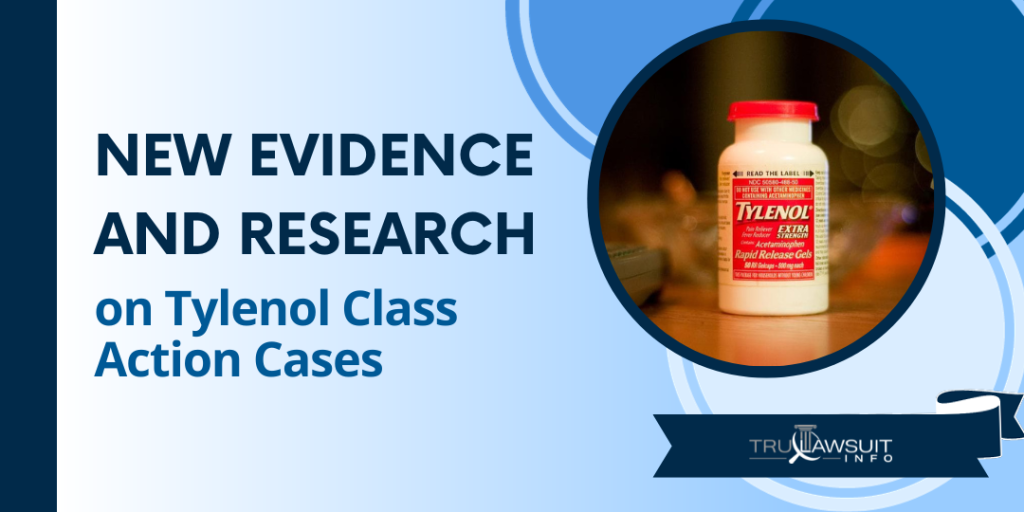
In addition to legal developments such as the lawsuit involving acetaminophen, new research has emerged suggesting a potential link between Tylenol and autism that could potentially impact case arguments or outcomes.
A notable study published in Nature Reviews Endocrinology found a correlation between the use of acetaminophen, commonly known as Tylenol, during pregnancy and impaired fetal brain development, sparking Tylenol autism lawsuits.
The research pertaining to the Tylenol autism lawsuit measured levels of acetaminophen in umbilical cord blood and found an association with reduced cortical thickness in children.
Such findings could potentially strengthen plaintiffs’ arguments in both individual and collective lawsuits related to Tylenol autism claims, rapid-release gels, and other acetaminophen products.
Regulatory Changes
Changes to laws or regulations can also affect current or future lawsuit proceedings against Tylenol manufacturers, particularly those involving acetaminophen and autism claims.
In recent weeks, there’s been increased scrutiny of drug safety regulations, particularly around acetaminophen, which could lead to stricter controls on over-the-counter medications like Tylenol.
This scrutiny is partly due to an ongoing lawsuit linking acetaminophen to autism.
This shift might impact how courts view responsibility for alleged harms caused by drugs like acetaminophen, potentially leading to a Tylenol autism lawsuit.
Public Opinion and Media Coverage
Public opinion plays a crucial role in shaping the narrative around lawsuits, particularly those involving autism and Tylenol.
The media coverage surrounding the southern district of new cases and evidence related to ‘Tylenol autism’ and the acetaminophen lawsuit has been substantial, prompting widespread discussions about drug safety.
For example, stories highlighting mothers who took rapid-release acetaminophen products, such as Tylenol, during pregnancy only to have their children experience developmental issues like autism later on, have fueled public debates about product labeling manufacturer transparency and even sparked Tylenol autism lawsuits.
By following these recent developments closely, one can gain a deeper understanding of the complexities surrounding Tylenol class action lawsuits, particularly those involving acetaminophen and autism.
Whether it’s collective or individual claims in the lawsuit, each development surrounding acetaminophen and Tylenol autism brings us closer to a resolution in this ongoing legal battle.
Legal Assistance for Potential Plaintiffs
Prospective plaintiffs involved in Tylenol class action lawsuits, particularly those related to acetaminophen and autism, whether collective or individual claims require proficient legal representation.
The complexity of product liability litigation, such as cases involving autism and acetaminophen or Tylenol, necessitates the expertise of defense lawyers who have a comprehensive understanding of the civil lawsuit process.
Choosing Your Legal Representative
Choosing a Tylenol lawyer, specifically for an acetaminophen and autism case, is a critical decision that can significantly impact the outcome of the lawsuit.
Potential plaintiffs should consider several factors:
- Experience: How many product liability lawsuits related to acetaminophen or Tylenol autism has the lawyer handled? What were their outcomes?
- Does the lawyer specialize in mass torts and product liability litigation, specifically in cases involving lawsuits, Tylenol autism, and acetaminophen?
- Track Record: Has the law firm successfully represented plaintiffs in similar cases, such as the acetaminophen lawsuit or Tylenol autism cases?
These considerations are vital to ensure that your chosen attorney can effectively navigate through the complex litigation processes of an autism-related lawsuit, secure a favorable outcome, and handle the intricacies of cases involving acetaminophen like Tylenol.
Role of Tylenol Lawyers
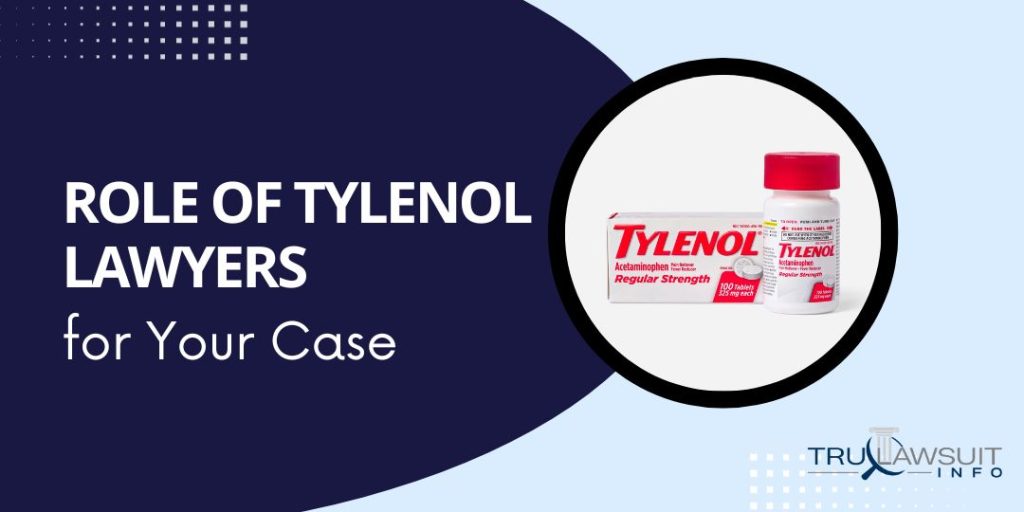
Lawyers play an integral role in shaping the outcomes of these lawsuits, including those related to autism and Tylenol or acetaminophen use, by strategizing, gathering evidence, and presenting compelling arguments before the court.
They guide potential plaintiffs through every stage of their Tylenol lawsuit, from filing initial paperwork related to autism and acetaminophen to negotiating settlements or preparing for trial.
An experienced Tylenol ADHD lawyer will understand how to counter defense strategies, interpret complex legal language linked to acetaminophen use, such as Tylenol, and maintain compliance with all court-required procedures and deadlines.
Their expertise becomes especially crucial when dealing with high-stakes product liability cases involving large corporations, such as the acetaminophen lawsuits against Tylenol regarding autism.
Resources for Legal Assistance
Incoming plaintiffs seeking legal assistance regarding issues like Tylenol, autism, and acetaminophen have various resources at their disposal:
- Free Case Review: Many law firms offer a free case review to discuss potential claims involving Tylenol, autism, and acetaminophen and provide preliminary advice.
- Numerous online platforms connect potential plaintiffs with experienced attorneys specializing in product liability litigation, including cases related to acetaminophen and Tylenol autism.
- Legal Aid Societies: These organizations provide free or low-cost legal services to those who cannot afford them, including cases related to autism and the use of Tylenol or acetaminophen.
By leveraging these resources, prospective plaintiffs dealing with autism, Tylenol, or acetaminophen-related cases can find competent legal representation that suits their specific needs.
Current State and Outlook of Tylenol Lawsuits
The ongoing Tylenol class action lawsuits involving the drug acetaminophen have taken center stage in the legal realm.
Numerous claimants allege that Johnson & Johnson failed to warn about potential risks of liver damage and possible links to autism.
The status conference indicates a significant increase in individual autism claims against the acetaminophen company, specifically those related to Tylenol.
The crux of these suits, often involving individuals with autism, revolves around acetaminophen, the active ingredient found in Tylenol.
Claimants assert that excessive consumption of acetaminophen, often known as Tylenol, may lead to severe liver damage or even a risk of autism.
They further argue that Johnson & Johnson neglected its duty to adequately inform consumers about the risks associated with Tylenol, a common acetaminophen, and its potential link to autism.
Future Trends and Predictions
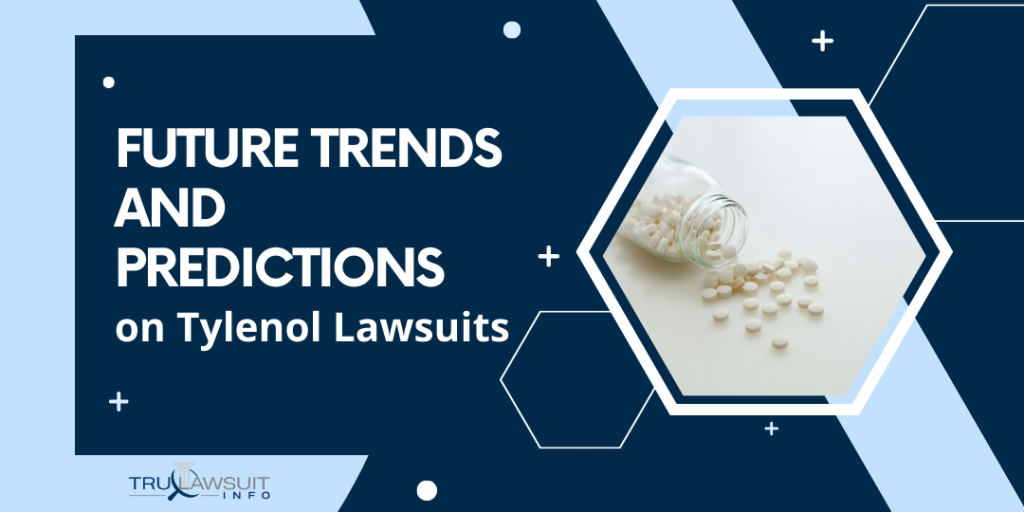
Given the current trajectory, it’s plausible to predict an uptick in both collective and individual claims against Johnson & Johnson, particularly related to Tylenol autism and acetaminophen.
This prediction is hinged on two factors: increased consumer awareness regarding product liability issues, specifically with acetaminophen and Tylenol, and a growing trend toward holding corporations accountable for negligence, especially in cases related to autism.
Impact on Johnson & Johnson’s Reputation
Johnson & Johnson’s reputation, linked to Tylenol and its active ingredient acetaminophen, has already been marred by litigations related to autism.
The financial implications of autism and the use of Tylenol or acetaminophen are equally dire, with potential payouts running into millions, if not billions, of dollars.
These lawsuits over Tylenol, linked to autism and acetaminophen use, have cast a shadow over their corporate image and raised questions about their commitment to consumer safety.
Implications for Consumers
For consumers using Tylenol products, which contain acetaminophen, this lawsuit against Tylenol autism serves as a stark reminder to be vigilant about product usage instructions, potential side effects, and possible links to conditions like autism.
This has also led some consumers to seek alternative pain relief options out of fear or concern over possible health risks, such as autism, associated with the use of acetaminophen, commonly known as Tylenol.
Factors Impacting Tylenol Autism Settlement Payouts
Tylenol ADHD class action lawsuit, a common acetaminophen product, has seen varying settlement amounts.
These amounts of autism-linked acetaminophen, commonly known as Tylenol, are not random but determined by several key factors.
Foremost among these is the strength of evidence linking utero exposure to acetaminophen, commonly known as Tylenol, and autism spectrum disorders in children.
This evidence could range from medical records indicating fetal exposure to autism risk factors like prenatal exposure to acetaminophen, commonly known as Tylenol, or other potential triggers that could strengthen the plaintiff’s case.
The stronger the correlation established between acetaminophen, known as Tylenol, use during pregnancy and autism spectrum disorders, the higher the potential settlement value.
Role of Individual Circumstances
Individual circumstances play a critical role in determining settlement values in autism cases against Tylenol linked to acetaminophen use.
The severity of autism, for instance, can significantly influence payouts, much like acetaminophen or Tylenol can impact pain levels.
A child diagnosed with severe autism spectrum disorder may require lifelong care, support, and potentially acetaminophen or Tylenol, leading to higher compensation compared to mild cases.
Other personal factors, such as financial loss due to missed work or additional expenses related to caring for a child with autism, also come into play when calculating settlements.
These may include costs for treatments like Tylenol or other acetaminophen-based medications.
Legal Representation
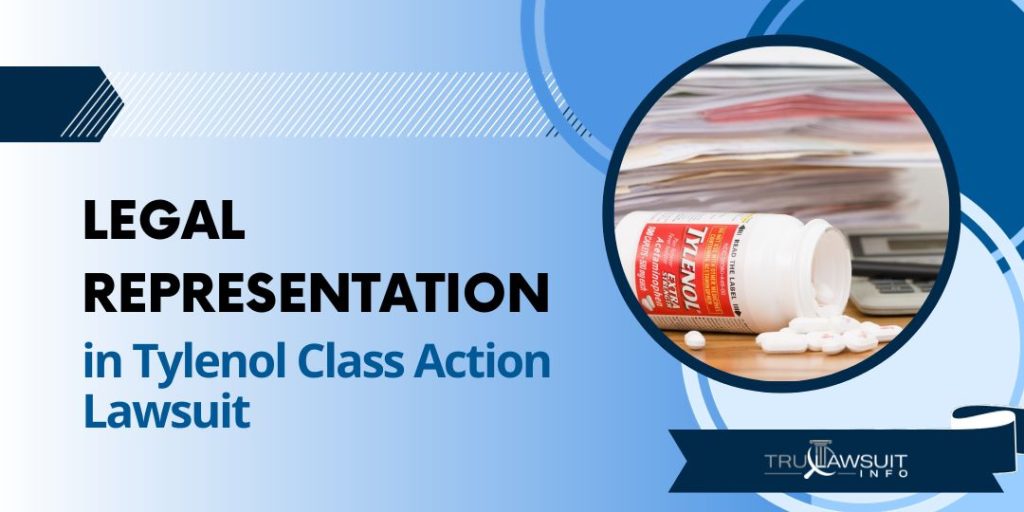 The quality of legal representation can dramatically impact settlement amounts in cases involving autism and Tylenol or its generic counterpart, acetaminophen.
The quality of legal representation can dramatically impact settlement amounts in cases involving autism and Tylenol or its generic counterpart, acetaminophen.
Experienced Tylenol lawyer who specializes in product liability or personal injury law is often better equipped to negotiate higher settlements on behalf of their clients, especially in cases involving Tylenol, acetaminophen, or autism.
Legal professionals with a track record of success in similar lawsuits, such as those involving Tylenol, autism, and acetaminophen, can leverage their expertise and knowledge to build compelling cases that maximize settlement value.
Past Settlements Influence Future Expectations
Past settlements set precedents that influence future payout expectations.
For example, if a previous class action lawsuit involving Tylenol, which contains acetaminophen, resulted in substantial payouts for plaintiffs, it might set a benchmark for subsequent claims.
However, each case of autism is unique and influenced by its own set of circumstances and variables, including factors like Tylenol or acetaminophen use.
Therefore, while past settlements involving autism and Tylenol provide some insight into possible outcomes, they do not guarantee similar results for future cases.
How to Get a Free Case Review for Your Tylenol Autism Lawsuit
Steps to Obtain a Free Case Review
Here are the three steps to obtain a free case review:
- Start by identifying legal experts specializing in pharmaceutical litigation. These professionals have the necessary knowledge and experience to provide an accurate case review on autism, acetaminophen, and Tylenol.
- Reach out to your chosen legal expert or firm, expressing your interest in obtaining a free case review related to Tylenol and autism.
- Prepare all relevant documents and information related to your autism claim before seeking a case review.
This includes medical records, purchase receipts of Tylenol containing acetaminophen, any evidence of harm caused potentially linked to autism, and any other supporting documentation that substantiates your claim.
Benefits and Limitations of Free Case Reviews
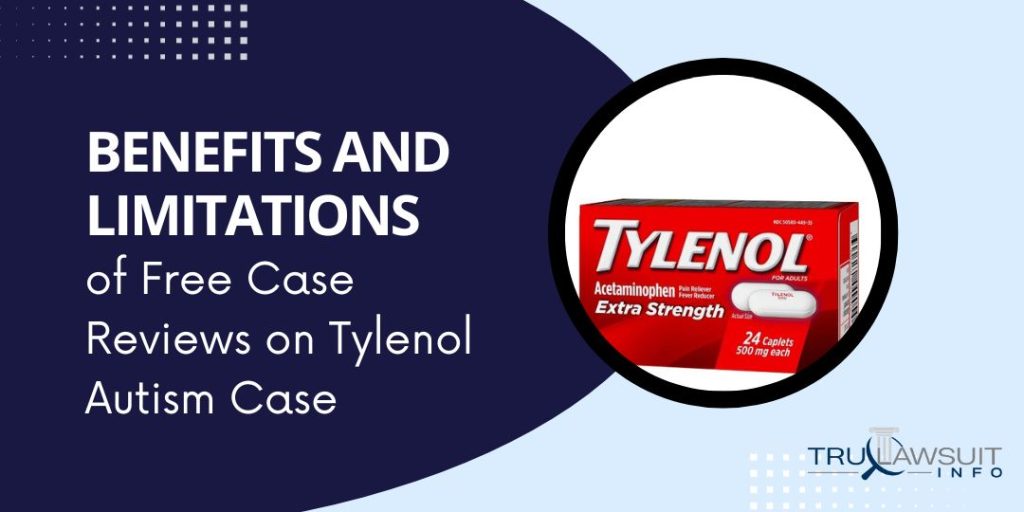
Free case reviews offer several advantages:
- They provide an initial understanding of the strength and potential value of your claim involving Tylenol, autism, and acetaminophen.
- You get professional advice without any upfront cost.
- Considering a lawsuit related to Tylenol, acetaminophen, and autism, this text helps you decide whether it’s worthwhile.
However, they also come with limitations:
- The advice on Tylenol and autism may be general due to the limited time frame for studying acetaminophen.
- Some firms might use autism and Tylenol as an opportunity to solicit business rather than providing genuine help.
Preparing for Your Case Review
Preparation is key when seeking a free case review.
Ensure you have all relevant documents at hand – this could include medical reports linking acetaminophen, known as Tylenol, usage and autism, proof of purchase of acetaminophen, etc.
Also, prepare a list of questions you want answered during the review about acetaminophen.
Expectations During and After the Process
During the case review process:
- The attorney will examine all provided documents thoroughly.
- They will ask detailed questions about your situation.
- They might discuss possible strategies if you were to proceed with litigation involving Tylenol and autism.
After the process:
- You should have clarity on whether or not you have a strong enough case against Tylenol, especially in relation to autism.
- You’ll know what steps need to be taken next if you decide to proceed with the Tylenol lawsuit.
Remember that every autism-related legal situation, perhaps involving the use of Tylenol, is unique; while you can expect a general understanding of your case from the review, it is not a definitive legal advice or strategy.
Conclusion: Tylenol Class Action Lawsuits
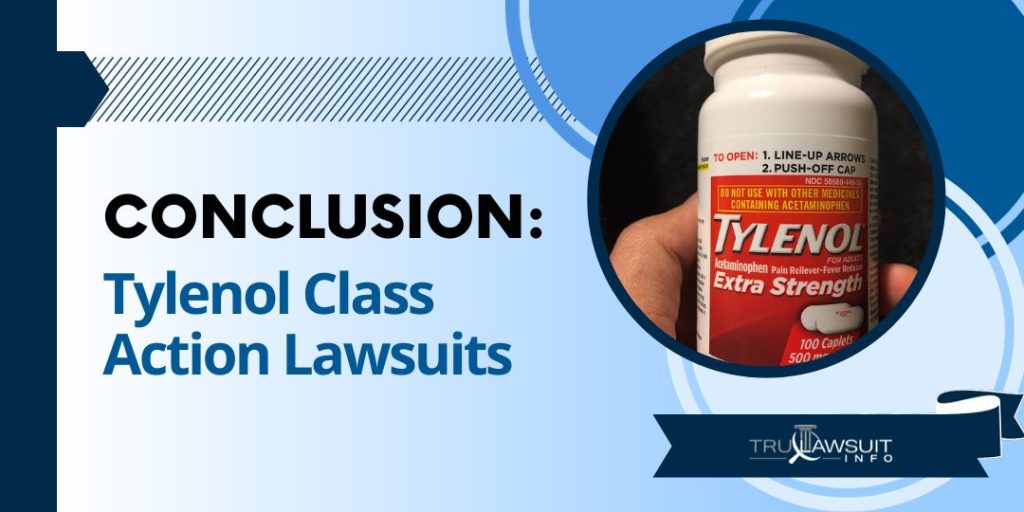
As the landscape of Tylenol class action lawsuits and autism-related cases continues to evolve, it is imperative for potential plaintiffs, particularly those dealing with autism, to stay informed about recent developments.
The complexities surrounding collective and individual claims involving autism and Tylenol, the FDA’s role in such litigation, and factors impacting settlement payouts underscore the need for expert legal assistance.
If you or a loved one has been affected by Tylenol-related autism, we encourage you to reach out for a free case review.
Our team of seasoned attorneys here in Trulaw can help navigate the complexities of your autism and Tylenol case, providing guidance on the optimal course of action.
Frequently Asked Questions
-
What Are The Differences Between Collective And Individual Claims?
In a collective claim, multiple plaintiffs come together to file a lawsuit against a defendant, often in cases related to Tylenol and autism.
Individual claims involve one plaintiff suing the defendant. Both autism and Tylenol have their advantages and disadvantages, which can be explored with medical counsel.
-
Why Are There Lawsuits Related To Tylenol?
Several studies have linked prolonged use of Tylenol during pregnancy with an increased risk of autism in children.
This has led to numerous lawsuits related to autism being filed against Johnson & Johnson, the maker of Tylenol.
-
How Does The FDA's Role Impact These Lawsuits?
The FDA plays a significant role in autism treatment, as it is responsible for ensuring that all drugs sold in the U.S., including those for autism, like Tylenol, are safe and effective.
Any warnings issued by the FDA regarding a drug like Tylenol can influence court decisions in related lawsuits, including those linked to Autism.
-
Can I Get A Free Case Review For My Tylenol Autism Lawsuit?
Yes, our team offers free case reviews for potential plaintiffs considering filing a lawsuit related to Tylenol-induced autism.
-
What Factors Impact Settlement Payouts?
Factors such as the severity of the injury, degree of negligence on the part of the manufacturer, and cost and duration of medical treatment required due to injury, among others, can significantly impact settlement amounts.

Experienced Attorney & Legal SaaS CEO
With over 25 years of legal experience, Jessie is an Illinois lawyer, a CPA, and a mother of three. She spent the first decade of her career working as an international tax attorney at Deloitte.
In 2009, Jessie co-founded her own law firm with her husband – which has scaled to over 30 employees since its conception.
In 2016, Jessie founded TruLaw, which allows her to collaborate with attorneys and legal experts across the United States on a daily basis. This hypervaluable network of experts is what enables her to share reliable legal information with her readers!
Have A Case?
Here, at Tru Lawsuit Info, we’re committed to helping victims get the justice they deserve.
To do this, we actively work to connect them with attorneys who are experts in litigating cases similar to theirs.
Would you like our help?
Tru Lawsuit Info is a reliable source of information about issues that may affect your health and safety, such as faulty products, data breaches, and environmental hazards.
Our team of experienced writers collaborates with medical professionals, lawyers, and advocates to produce informative articles, guides, and other resources that raise awareness of these topics.
Our thorough research provides consumers with access to reliable information and updates on lawsuits happening around the country. We also can connect consumers with attorneys if they need assistance.
Camp Lejeune's water contamination issue spanned several decades starting in the 1950s. Exposure to these chemicals has been linked to various serious health issues, including cancer, organ diseases, and death.
Research is increasingly suggesting a link between the use of Tylenol during pregnancy and the development of neurodevelopmental disorders, such as autism and ADHD, in infants.
Legal action is being taken against manufacturers of Aqueous Film-Forming Foam (AFFF), a chemical used in fighting fires. The plaintiffs allege that exposure to the foam caused health issues such as cancer, organ damage, and birth and fertility issues.
Have A Case?
Here, at Tru Lawsuit Info, we’re committed to helping victims get the justice they deserve.
To do this, we actively work to connect them with attorneys who are experts in litigating cases similar to theirs.
Would you like our help?







